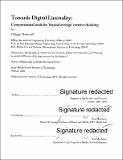| dc.contributor.advisor | Tod Machover. | |
| dc.contributor.author | Mothersill, Philippa
(Philippa Jane). | en_US |
| dc.contributor.other | Program in Media Arts and Sciences (Massachusetts Institute of Technology) | en_US |
| dc.date.accessioned | 2022-08-31T16:13:41Z | |
| dc.date.available | 2022-08-31T16:13:41Z | |
| dc.date.copyright | 2019 | en_US |
| dc.date.issued | 2020 | en_US |
| dc.identifier.uri | https://hdl.handle.net/1721.1/145213 | |
| dc.description | Thesis: Ph. D., Massachusetts Institute of Technology, School of Architecture and Planning, Program in Media Arts and Sciences, February, 2020 | en_US |
| dc.description | "February 2020." Cataloged from the official PDF of thesis. | en_US |
| dc.description | Includes bibliographical references (pages 102-111). | en_US |
| dc.description.abstract | Renowned designer Kenya Hara writes: "Creativity is to discover a question that has never been asked". These questions are commonly discovered early in the design process; an often ambiguous and liminal experience where new information is explored and considered in non-obvious ways to reveal unexpected associations. 'Intelligent' digital technologies such as machine learning are increasingly employed in tools used in the early phases of the design process. These computational techniques undeniably surpass humans at quickly generating numerous designs and calculating 'optimised' responses, but their average-driven approaches are limited when it comes to embracing the serendipity that can inspire creative breakthroughs. How can we develop digital tools to augment this liminal period of the creative process and help designers discover unexpected ideas? | en_US |
| dc.description.abstract | This dissertation explores this question through three new 'Beyond Average' systems that integrate ambiguity and serendipity into digitally-enabled design tools: the Reframe creative prompt tool that juxtaposes language from a designer's notes in surprising ways to provoke new associations between concepts in their project; the Looking Sideways inspiration exploration tool that presents a diverse range of content for each search query and suggests connections between the concepts discovered; and the digitally-augmented Design Daydreams ideation table and post-it note that seamlessly connects the physical and digital content that designers use in their creative processes. These systems were informed by field research and interviews with expert designers and their impact on the design process was evaluated through several interventions in which creative practitioners, entrepreneurs and technologists used the Beyond Average tools to inspire new ideas for their projects. These interventions highlighted that the creative disruptions these tools provoke cannot exist alone; they must be situated in a larger creative process that accommodates for serendipitous interjections and unanticipated ideas. Overall, this research demonstrates how embedding liminality into digital tools creates a space within the design process for serendipitous inspiration and helps designers apply these innovative ideas, pointing towards new questions to consider as we design the future of our creative work. | en_US |
| dc.description.statementofresponsibility | by Philippa Mothersill. | en_US |
| dc.format.extent | 116 pages | en_US |
| dc.language.iso | eng | en_US |
| dc.publisher | Massachusetts Institute of Technology | en_US |
| dc.rights | MIT theses may be protected by copyright. Please reuse MIT thesis content according to the MIT Libraries Permissions Policy, which is available through the URL provided. | en_US |
| dc.rights.uri | http://dspace.mit.edu/handle/1721.1/7582 | en_US |
| dc.subject | Program in Media Arts and Sciences | en_US |
| dc.title | Towards Digital Liminality : computational tools for 'beyond average' creative thinking | en_US |
| dc.title.alternative | Computational tools for 'beyond average' creative thinking | en_US |
| dc.type | Thesis | en_US |
| dc.description.degree | Ph. D. | en_US |
| dc.contributor.department | Program in Media Arts and Sciences (Massachusetts Institute of Technology) | en_US |
| dc.identifier.oclc | 1342115728 | en_US |
| dc.description.collection | Ph. D. Massachusetts Institute of Technology, School of Architecture and Planning, Program in Media Arts and Sciences | en_US |
| dspace.imported | 2022-08-31T16:13:41Z | en_US |
| mit.thesis.degree | Doctoral | en_US |
